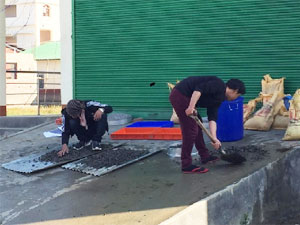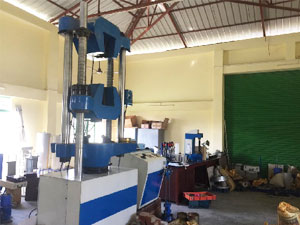Civil Engineering
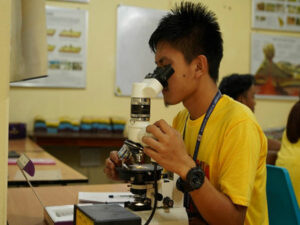
About
In engineering geology lab classes, UG students handle actual hand specimens of rocks and minerals. Based on their natural physical properties, they would identify the minerals and rocks. An additional component of it is the analysis of geological maps in conjunction with civil engineering projects. Additionally, a field excursion is also planned for this course. The students will be able to recognise the various geological structures like faults, folds, bedding, joints etc. in the field area.
Utilisation
This lab is used by all third-year (5th Semester) UG students in the department.
Faculty in charge
Dr Kakchingtabam Anil Sharma
(Assistant Professor)
Co-ordinator
(Lab Assistant)
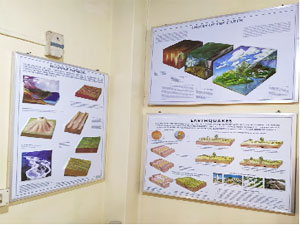
Laboratory Equipment
- Rock-forming mineral samples: olivine, pyroxene, amphibole, quartz, feldspar group, garnet, mica, talc, chlorite, asbestos, calcite, gypsum, etc
- Ore forming mineral samples: magnetite, hematite, pyrite, pyrolusite, graphite, chromite etc
- Rock samples: Igneous (granite, basalt, gabbro, lamprophyre), Sedimentary (sandstone, shale, limestone, and conglomerate) and Metamorphic (marble, slate, phyllite, gneiss, schist)
- 3D model of geological structure and landform
- Petrographic polarised light microscope
- Geological map
- Field training
Reference books
- A.K. Sen, Laboratory Manual of Geology, Modern Book Agency Private Limited, Calcutta.
- P.K. Mukerjee, Textbook of Geology, World Press Pvt. Ltd., Kolkatta
- Laboratory Manual in Physical Geology, Person
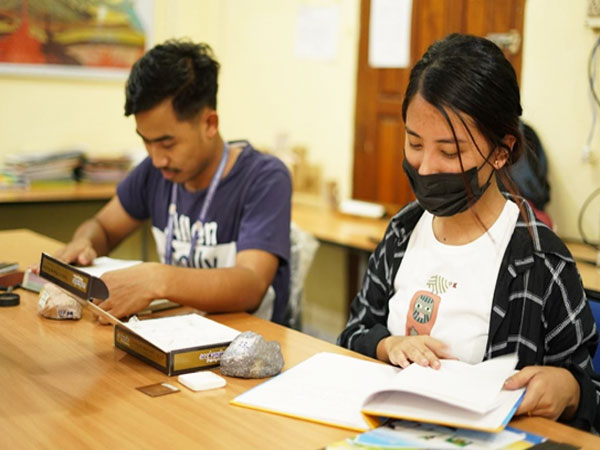
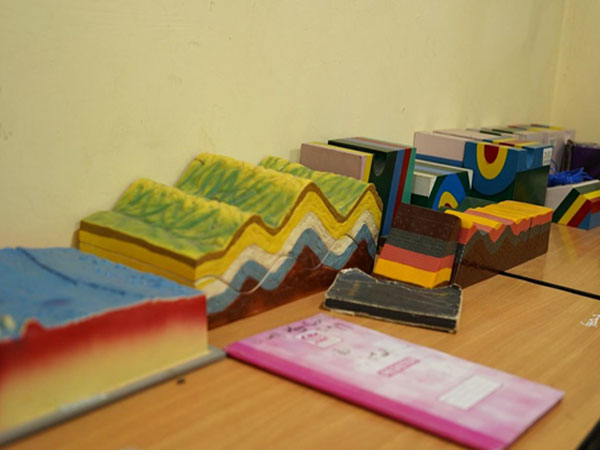
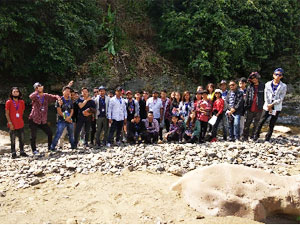
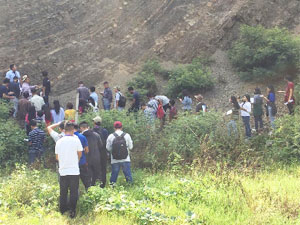
About
To make the practical assignments for UG students’ coursework more manageable, the Department of Civil Engineering built the Civil Computer Application Laboratory. This lab would support learning and research-related tasks. Students can come into this Lab to use the Personal Computer with the most recent versions of IGIS, AutoCAD, and Microsoft Office Excel as needed for project support. This lab would help the students to become globally competitive and industry-ready.
Utilisation
This lab is used by all undergraduate students in the university.
Faculty In-charge
Nongmaithem Anand (Assistant Professor)
Co-ordinator
Meijianglung Malangmei (Lab Assistant)
Laboratory Equipment
- 34 Personal Computer
- AutoCAD for BPD & Water Resources
- Microsoft Office Excel for Water Resources
- Microsoft Project for Construction Management
List of Experiments
- BPD – Basic AutoCAD Command
- WR – Design of Gravity Dam, Construction of phreatic line of Earth dam, Stability Analysis of Earth dam.
- CM- Preparation of Microsoft Project schedule for RCC Building
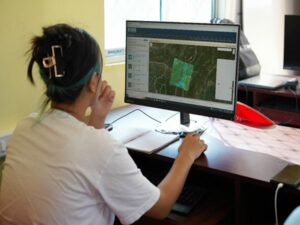
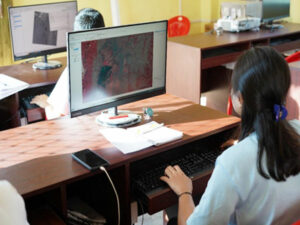
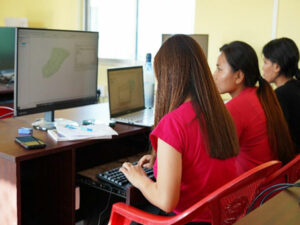
About
Geotechnical engineering is the branch of civil engineering that is responsible for determining the strength and engineering behaviour of both soil and rocks. Geotechnical engineering is important in civil engineering since every construction is carried out on the ground and understanding the behaviour of the ground materials (soil and rocks) before construction is essential to prevent failure of the structure. In the Geotechnical Engineering laboratory, students are familiarized with instruments being used for various geotechnical investigations. Additionally, the students will learn how to use the various geotechnical laboratory tools and comprehend the significance of soil testing. Furthermore, the fundamentals of examining the subsurface conditions of a construction site, determining the strength of the ground materials, determining the relevant physical/mechanical and chemical properties of these materials, evaluating and assessing risks related to site conditions, monitoring site conditions, and much more will also be taught to the students.
Faculty In-charge
Koko Karbia (Assistant Professor)
Co-ordinator
Oinam Ichan Devi (Lab Assistant)
Laboratory Equipment
- Triaxial testing machine
- Unconfined Compression testing machine
- Direct shear test
- Core cutter
- Specify gravity test using Pycnometer and Density bottle
- Balance & scale
- Standard Proctor Test Apparatus
- Modified Proctor Test Apparatus
- Sand Replacement Test Sets
- Liquid limit device (Casagrande apparatus)
- Plastic Limit Test Sets
- Falling Head Soil Permeability Apparatus
- Constant Head Permeability Apparatus
- Consolidation test Apparatus
- California Bearing Ratio machine
- Hot air oven
- Point load testing machine
- Compressive strength testing machine
Reference Book
- Soil Mechanics and Foundation B.C. Punmia, Ashok Kumar Jain
- Soil Mechanics and Foundation Engineering by K. R. Arora
- Basic and Applied Soil Mechanics by Ranjan Gopal.
- Laboratory Testing of Soils, Rocks and Aggregates by N.Sivakugan
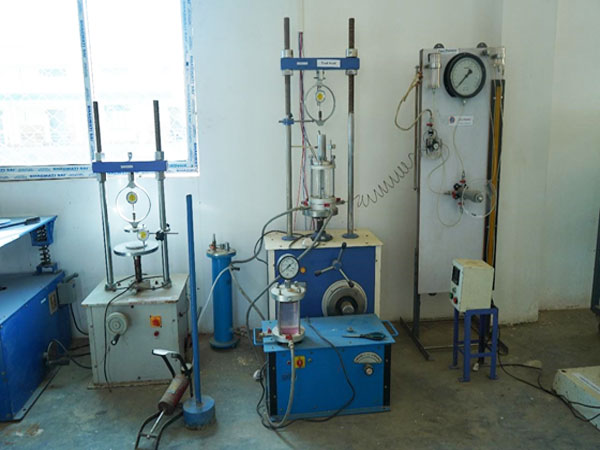
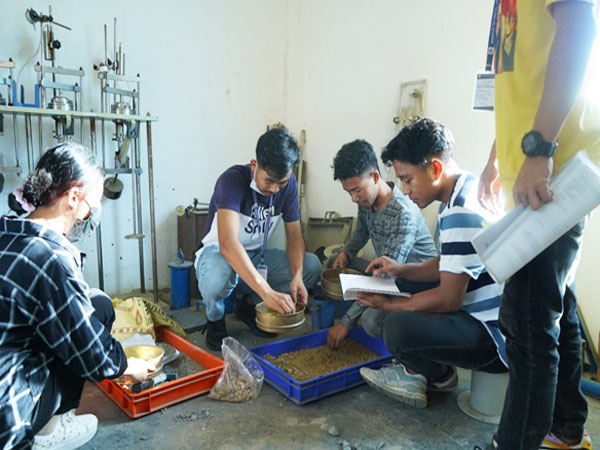
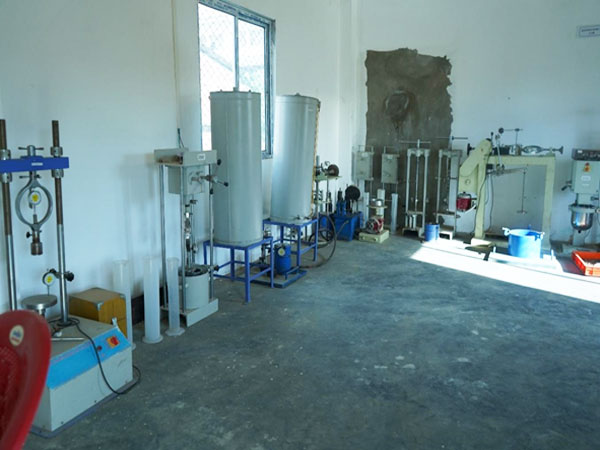
About
Surveying Laboratory is fully furnished with all the necessary equipment and tools that aid in a student’s overall comprehension and practical knowledge. The methods for using both conventional and contemporary instruments to collect field data are taught to students.
Additionally, students will learn how to effectively use fundamental surveying tools like theodolite, tacheometry, total station, and GPS. They will also gain the necessary knowledge to perform triangulation and astronomical surveying as well as general field marking for a variety of engineering projects, site locations, etc.
Reference Book
- Punmia B. C Laxmi Publication (P) Ltd. New Delhi
Faculty In-charge
Yaikhomba Moirangthem (Guest Lecturer)
Co-ordinator
Meijianglung Malangmei (Lab Assistant)
Laboratory Equipment
- Total Station
- GPS
- Auto level & Dumpy level
- Vernier Theodolite & Transit Theodolite
- Prismatic Compass and Surveyor’s Compass
- Plane Table
- Levelling Staff
- Tripod, Alidade, Plumbing Fork, Spirit Level, Trough Compass
- Optical Square & Cross Staff
- Metric Chain, Tape, Plumb Bob, Peg, Ranging Rod & Arrows
- Software- IGIS
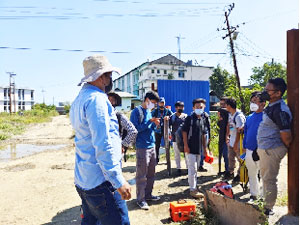
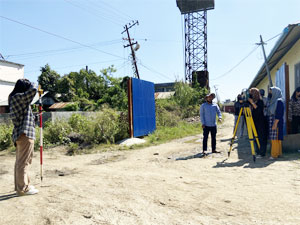
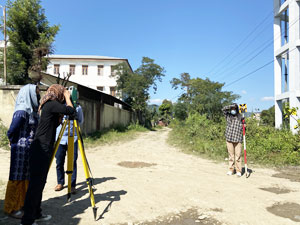
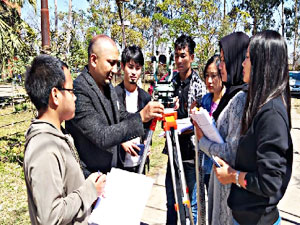
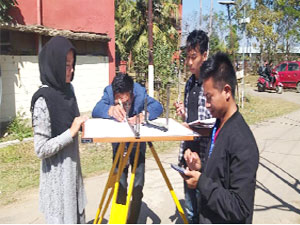
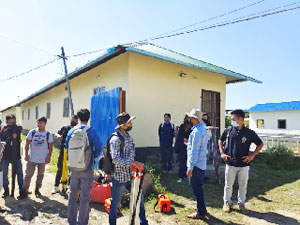
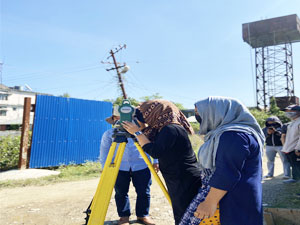
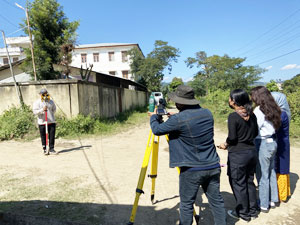
About
The fluid mechanics laboratory is run in association with the theory course Fluid Mechanics. It is the introductory course where flow behaviour and fluid force are introduced. In this laboratory class, Students will be able to distinguish and calibrate different flow measuring devices, characterize the flow field based on the Reynolds number, measure the pressure distribution on streamlined to calibrate the friction in pipe and visualize the flow around the objects using flow visualization techniques.
Laboratory Equipment
The list of Equipments and its purposes are listed below:
| Sl.No | Name of Equipment | Purpose of Equipment |
| 1 | Hydraulic Bench | To experiment with a hydraulic bench, with separate experiential setups i.e., Hydrostatic Pressure, Flow over Weirs, Bernoulli’s Theorem, and Flow meter Demonstration. |
| 2 | Bernoulli’s theorem apparatus | To study the flow through a variable area duct and verify Bernoulli’s energy equation. |
| 3 | Venturimeter & orifice meter apparatus | To determine the coefficient of discharge for an obstruction flow meter. |
| 5 | Head Loss in pipe fitting due to valves and bonds, sudden enlargement & contraction apparatus | To determine the head loss in a pipeline due to sudden expansion / sudden contraction/ bend. |
| 6 | Laminar and turbulent flow | To determine Laminar and turbulent flow |
| 7 | Impact jet | To study hydraulic force |
Faculty-in-charge: Nongmaithem Anand (Assistant Professor)
Co-ordinator: Veineilam Kipgen (Lab Assistant)
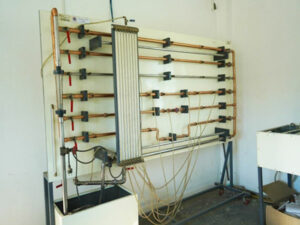
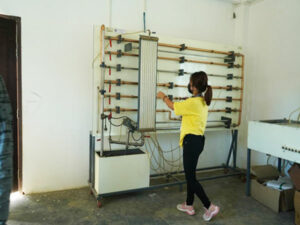
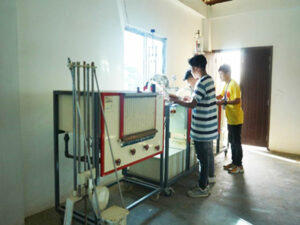
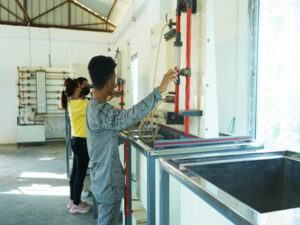
About
The Transportation Engineering lab has the equipment required to conduct all standardized tests to assess the quality of highway materials and pavement evaluation. In this lab class, students will be able to infer the suitability of the materials for the construction of the road. This laboratory course will help the students to understand the theoretical concepts learned in the course of transportation engineering.
The objective of the Transportation Engineering laboratory is to determine some of the properties of coarse aggregates and bitumen. Experiments include tests for impact, abrasion, attrition test and crushing strength for coarse aggregate and tests for penetration, ductility, viscosity, softening point and flash and fire point for bitumen.
Laboratory Equipment
List of Experiment conducted in Aggregate Materials
| Sl. No | Name of Equipment | Name of Experiments for Bitumen |
| 1 | Pycnometer | Specific Gravity |
| 2 | Impact Testing Machine | Impact test |
| 3 | Aggregate Crushing Machine | Aggregate Crushing Value Test |
| 4 | Los Angeles Abrasion testing machine | Los Angeles Abrasion test |
| 5 | Set of wire mesh type test sieve | Sieve Analysis |
| 6 | Standard thickness gauge & Standard-length gauge | Shape Test |
List of Experiments conducted in Bituminous Materials
| Sl. No | Name of Equipment | Name of Experiments |
| 1 | Pycnometer | Specific Gravity |
| 2 | Penetrometer | Penetration test |
| 3 | Ring and Ball Apparatus | Softening Point |
| 4 | Ductility Testing Machine | Ductility/Elastic Recovery |
| 5 | Viscometer | Viscosity |
| 6 | Pensky-Martens Closed Cup & Open Cup tester | Flash & Fire point |
| 7 | Marshal stability testing Machine | Marshal stability test (Bituminous mixes) |
| 8 | Bump Indicator | Road roughness measurement (Pavement) |
Faculty-in-charge: Gyanen Takhelmayum (Assistant Professor)
Co-ordinator: Veineilam Kipgen (Lab Assistant) & Oinam Ichan Devi (Lab Assistant)
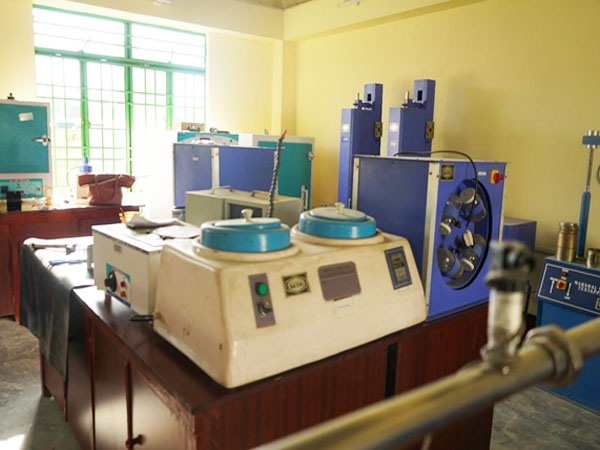
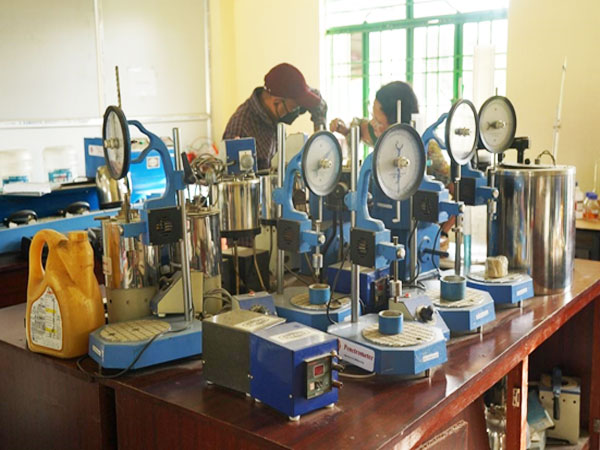
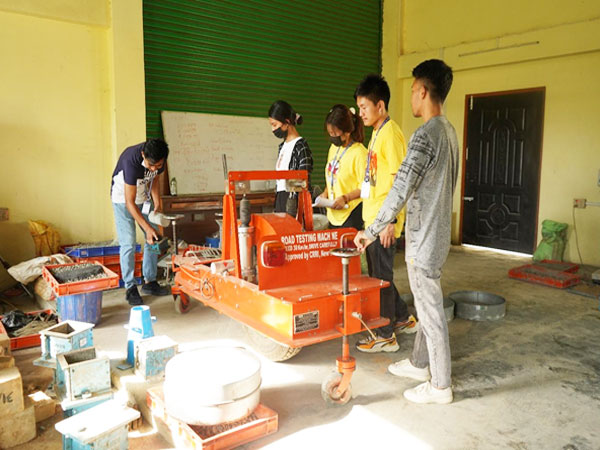
About
The objective of the strength of materials lab is to demonstrate the basic principles in the area of strength and mechanics of materials and structural analysis to the undergraduate students through a series of experiments. In this lab the experiments are performed to measure the properties of the materials such as impact strength, tensile strength, compressive strength, hardness etc.
Utilisation: This lab is used by all undergraduate students in the university.
Faculty In-charge: Kosygin Leishangthem (Assistant Professor)
Laboratory Equipment
- Hydraulic Universal Testing Machine
- Compression Testing Machine
- Torsion Testing Machine
- Non-Destructive testing (NDT) like – Ultrasonic Pulse Velocity, Digital Schmidt Rebound Hammer, Analog rebound Hammer etc
List of Experiments
- Concrete Lab
- Material Testing Lab
- Non-Destructive Testing
